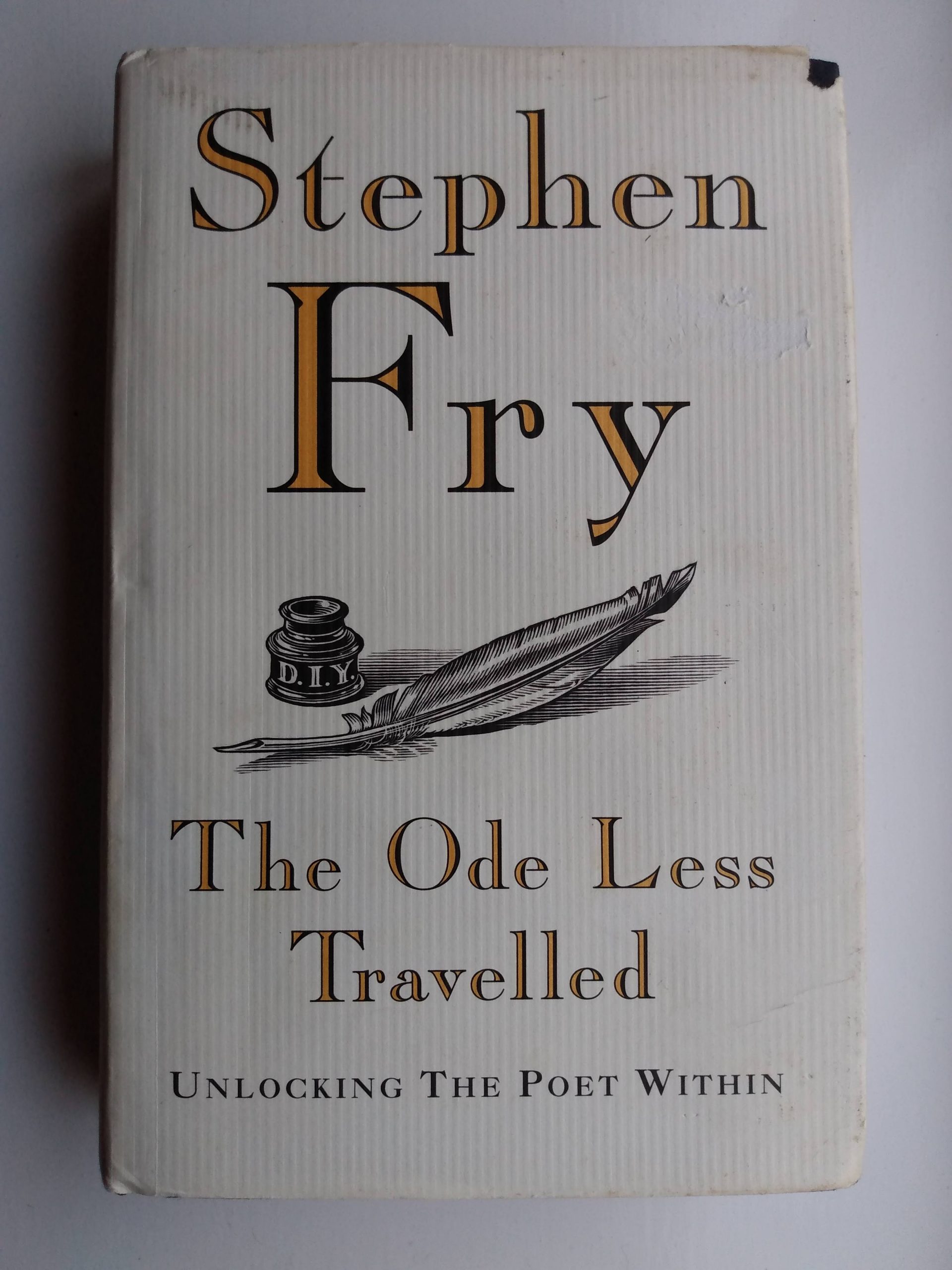The Ode Less Travelled, by Stephen Fry
I don't read much non-fiction. My reading tastes are pretty varied, as I'm sure a quick scan through this blog will demonstrate, but I have always been more enthralled by stories than by information. Non-fiction books about literature and language, though, are a different matter. This one was recommended to me - and kindly given to me - by a friend of my dad's, who reckoned I would get a kick out of it. Well, if you're reading this post: thank you. You were right.

'The Ode Less Travelled' is a sort of handbook, which aims to encourage its readers to write poetry. Fry is of the opinion that in order to write poetry (or indeed create anything artistic), one needs to be grounded in an understanding of 'the rules'. You need to know about form and structure, to understand the intricacies of rhythm and rhyme, to be furnished with the facts and taught the techniques used by poets over centuries, so that your creativity stems from knowledge. You can still choose to break the rules, but in order to do that, you need to know what the rules are. Fry's book, therefore, is an exploration and explanation of the essence of poetry, supplemented with a series of poetry-writing exercises, so that the reader emerges at the end of the book equipped to write poems themselves.
Considering I love poetry, and have already written a fair amount of it, this was right up my street. I found it absolutely fascinating, I learned a lot, and it even encouraged me to re-assess some of my own poetry in the light of these new techniques I was reading about. So it probably doesn't surprise you that I have rather a lot to say in this post. The book was divided into four sections ('Metre', 'Rhyme', 'Form', 'Diction and Poetics Today') and this post will be divided into the same four, in an attempt to stop myself from going on forever by sticking to a sort of structure. Much like Fry's approach to poem-writing!
I found the Metre section very exciting, because throughout the whole chapter the same thought kept on surfacing in my mind: Wow, there's a name for that! As a musician, I have always been very attuned to the rhythm of poetry. I always notice the way the stress falls, the number of beats per line, et cetera, and as a musician I have always thought of this in musical terms - like time signatures. I won't go into the details here, but in music there is a distinct difference between 'simple time' and 'compound time' - it's all to do with how many stressed beats there are in a bar, and how many parts each stressed beat is divided into. With poetry it's exactly the same; you have stressed beats, and within those stressed beats you have syllables. And what I discovered in this book was that there's a name for this system! I was able to immerse myself in all these gloriously intelligent new words and phrases, like 'trochaic substitution' and 'anapaestic tetrameter' - which were concepts I knew existed, but never knew what they were called! I was in my element.
One amusing side effect of reading so much about the metric system of poetry is that the rhythms and 'metric feet' do begin to seep into one's subconscious. Even Fry had some little footnotes analysing the metre of his own prose when it happened to fit one of the stress patterns he had described, and I found myself similarly noticing the metre of fragments of writing in a number of different contexts. I also recall that one night after having read a large chunk of the Metre chapter right before turning the light off I did actually dream in iambic pentameter. If that doesn't confirm that I am a total nerd, I don't know what will.
The next section was Rhyme, and I was excited to see what Fry had to say about it. I love rhyme. My poetry almost exclusively rhymes, and I find such a thrill in collecting like words. Here's a stanza from my poem 'November', in which I particularly relished the complicated rhyme scheme I created for myself. This bit is about my piano exam.
I've now done my grade eight! The acoustic was great
On a grand in a nice concert hall
The steward was chatty, I smashed the Scarlatti
I'm happy. Went well overall.
In my own poetry, I only settle for true rhymes. I consider half rhymes and near rhymes to be cheating and/or laziness. So I was surprised when Fry dedicated a whole section to the power of partial rhyming. I must confess he has opened my eyes to the beauty of a different kind of rhyme. It's called slant-rhyming, and it's where all the consonants in two words are the same, and only the vowel changes. Wild/world, lives/leaves, coal/call. The war poet Wilfred Owen employed this technique with great effect, and there were some examples of his slant-rhyme poetry printed that I found eerily beautiful. The 'rhyme' of friend/frowned or killed/cold or knive us/nervous is just as linguistically satisfying as chatty/Scarlatti.
Chapter Three was all about Form, and I was immensely impressed with the way this section was written. Fry introduced loads of different forms of poetry - some that I knew, sonnets, ballads, haikus, limericks, and some more obscure ones like Sapphic odes, villanelles, triolets and clerihews (such tasty words!!). And every single one was introduced in its own form. A sonnet explaining what a sonnet is. A sestina explaining what a sestina is. A quatrain about quatrains, a tanka about tankas. Poetry about poetry - meta-poetry. It was so clever and I loved it. Here's Fry's introduction to the form 'heroic verse.'
Heroic verse has passed the test of time:
Iambic feet in couplets linked by rhyme
Its non-stanzaic structure simply screams
For well developed tales and epic themes.
The five-stress line can also neatly fit
Sardonic barbs and aphoristic wit.
And so on. Such skill to write something like that.
The last section - Diction and Poetics Today - functioned as a sort of conclusion, a parting message of advice for poets. There was one sub-section where Fry wrote about 'being alert to language', noticing words, collecting words. This paragraph actually made me smile whilst I was reading it, because it so perfectly captured Fry's love of words - a love that I share, and a love that (ironically) is quite difficult to put into words. Here's some of it.
Others may let words go without plucking them out of the air for consideration and play, we do not. Every word has its own properties... The more aware you are of the origins, derivations, history, evolution, social usage, nuances and character of words the better. Their physical qualities are as important to a poet as their meaning - their weight, density, euphony, quantity, texture and appearance on the page. Their odour, in fact.
Overall, I really enjoyed this book. There was so much richly detailed new information in there, and everything written in a witty and endearing conversational tone.
I smiled and laughed and learnt a lot, from start right through to end
For all who like their poetry, I highly recommend.

Love your blog Annabel. What a great review, again